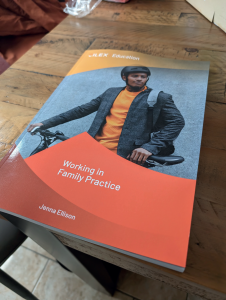
Jenna Ellison, Head of Family Law at Burd Ward Solicitors has had a text book published. The text book is aimed at CILEX students, but is available for all to purchase.
Working in Family Practice begins by introducing some key family law themes and then discusses the important issue of funding of family law proceedings. The course book then goes on to review the law relating to marriage and civil partnerships. The law and procedure for divorce and dissolution of a civil
partnership is then explained and the differences with judicial separation are outlined. The rights of cohabitants when relationship ends are also reviewed. Next, the book discusses Private Law Children, focussing on the application of the Children Act 1989 to the resolution of disputes between parents. Public Law Children is explained and the role of the state in child protection cases is described. Finally, the course book reviews the law relating to domestic abuse, including the requirements of the Domestic Abuse Act 2021.
This course book is suitable for paralegals and junior staff working in family practice teams, as well as for junior legal staff working in child protection teams in local authorities.
Jenna has been working with CILEX in varying roles over the last year. The Journey to creating this book started over five years ago. Jenna began teaching Level 3 Family Law and Level 6 Family Practice with The Law Academy, based in Liverpool. “I really enjoying teaching, I am really passionate about family law and teaching allows me to pass on this passion with the lawyers of the future”.
Jenna then got involved with CILEX directly with the apprenticeship program. Jenna has assisted in the development of what the role of an apprenticeship would involve, what they generally be involved with assisting a family team. In addition, creating example portfolios so that training providers are assisted with the standards expected.
This role lead to involvement with other programs. Jenna was then commissioned to assist with the syllabus drafting
and exam writing. This naturally led onto Jenna being commissioned to edit the text book that sat along this program. “It has been a real honor to write this text book, I was once told everyone has a book inside them, little did I know, mine would be a family law text book”.
Jenna Ellison, a solicitor and head of our family law department re-joined Burd Ward Solicitors in 2022 having initially trained with us back in 2015.
A lecturer and author, Jenna brings with her a wealth of experience and knowledge from her previous experience working in a city firm to the Family department. Jenna has previously represented both males and females who have been victims of domestic violence and has supported them obtaining orders to protect not only their own safety, but that of their children and home.
Jenna is also very experienced in dealing with Private law proceedings where there is a dispute between the parents regarding where the children should live and when they should spend time with the non resident parent. Jenna’s experience representing children have allowed her to assist both parents come to a child focused arrangement. Jenna has also had experience acting for both Fathers and Mothers when children have not been returned and offers an approach that is timely and professional.
For assistance in all aspects of of family law please contact Jenna Ellison on 0151 639 8273 or by emailing her directly at je@burdward.co.uk

We’re delighted to hear that Kash Mahmood a solicitor and the legal aid supervisor in our family law department has been re-accredited to the Law Society’s Children Law Accreditation scheme.
The Law Society’s Children Law Accreditation is a recognised quality standard for practitioners representing children in children law proceedings.
The accreditation covers all types of children law work and is recognised by the Legal Aid Agency.
It’s a way for clients and professionals (such as guardians) to choose a qualified practitioner when a child needs representation.
Kash Mahmood, a solicitor in our family law department joined Burd Ward in June 2022 following the merger of his firm Solicitorhelp.com. Kash has been a solicitor for over 25 years and has been a member of the Law Society’s Children Panel for the last 20 years. He specialises in Child Care cases, dealing with sensitive and often complex proceedings brought by social services and the courts where there are concerns about the care offered to a child or children.
Outside of work Kash is deeply involved with St John Ambulance regularly volunteering his spare time to them. Most recently he completed the Northumberland Coast Mighty Hike for Macmillan Cancer Support raising over £1,300 for the charity.
For assistance in all aspects of of family law please contact Kash Mahmood on 0151 639 8273 or by emailing him directly at km@burdward.co.uk

We’re happy to announce that Jenna Ellison, a solicitor and head of our family law department has received the Law Society’s Children Law Accreditation
The Law Society’s Children Law Accreditation is a recognised quality standard for practitioners representing children in children law proceedings.
The accreditation covers all types of children law work and is recognised by the Legal Aid Agency.
It’s a way for clients and professionals (such as guardians) to choose a qualified practitioner when a child needs representation.
Jenna Ellison, a solicitor and head of our family law department re-joined Burd Ward Solicitors in 2022 having initially trained with us back in 2015.
A lecturer and author, Jenna brings with her a wealth of experience and knowledge from her previous experience working in a city firm to the Family department. Jenna has previously represented both males and females who have been victims of domestic violence and has supported them obtaining orders to protect not only their own safety, but that of their children and home.
Jenna is also very experienced in dealing with Private law proceedings where there is a dispute between the parents regarding where the children should live and when they should spend time with the non resident parent. Jenna’s experience representing children have allowed her to assist both parents come to a child focused arrangement. Jenna has also had experience acting for both Fathers and Mothers when children have not been returned and offers an approach that is timely and professional.
For assistance in all aspects of of family law please contact Jenna Ellison on 0151 639 8273 or by emailing her directly at je@burdward.co.uk

Not everything in life works out the way people expect. The same applies to marriages and the divorce reform is a recognition of this. The Divorce, Dissolution and Separation Act 2020 has caused a shift within the divorce process, now removing the element of fault for divorces initiated after 31 March 2022.
Prior to the reform, the Matrimonial Causes Act 1973 placed a burden on the parties to prove the marriage broke down for one of the following 5 grounds:
Under the Matrimonial Causes Act 1973 there was also the option was for one spouse to request the other to pay their legal costs and the court fee. The court in such circumstances would bear in mind what caused the marriage to break down and if it was found to be by way of fault, it was common for the at fault spouse to incur the financial burden of the divorce costs. The shift to no-fault divorce removes the risk of one spouse having a cost order made against them on the basis of fault. Separating couples now can choose to share to costs to assist with the amicable breakup.
Even though the 5 grounds for divorce are no longer applicable, the couple still have to demonstrate that there has been an irretrievable breakdown in marriage, albeit not having to attach fault to one of the parties. This is now done by way of a statement and is sufficient on its own to procure the divorce, without the need for any further evidence.
The application for a divorce order can be made by one spouse, or both of them. The legal terminology for divorce has also had a revamp. What was previously known as ‘Decree Nisi’ is now changed to ‘Conditional Order’, and ‘Decree Absolute’ has now changed to ‘Final Order’. The reforms have cancelled out the opportunity to consent a divorce, allowing people to escape unhappy marriages without having to wait out the separation rule, or cause animosity between their former spouse by alleging fault.
In addition, the reforms have introduced a new 20 week cooling off period between the initial application for divorce proceedings and the conditional order. There is also a further cooling off period of 6 weeks and one day between the conditional order and final order. This awards the parties time to deal with any financial matters as discussed below.
While the aim of no-fault divorce is for the matter to be dealt with amicably, it is unsafe for the parties to assume that their financial position is automatically protected. The final divorce order (previously referred to as decree absolute) may legally end the marriage, but it does not end any financial commitments.
Therefore, it is important to seek legal advice and obtain a divorce financial order to protect your position at the time of the divorce and in the future. There are two types of court orders to award your finances protection: Consent Orders and Clean Break Orders. The latter is important for people with no current assets to consider, as any future assets one may acquire will be at risk of the former spouse making a financial claim to inherit a share of the same. A Clean Break Order will sever any financial ties and protect future assets. A Consent Order allows spouses with assets to create a legally binding financial agreement, dealing with how their assets will be divided. Once such an order is approved by the court, it will have the same effect as a Clean Break Order and sever financial ties after the current assets have been dealt with accordingly.
If you would like more information on finances and divorce, please do get in touch on 0151 639 8273.
We offer fixed fees for divorce and finance matters. In certain circumstances we are also able to offer legal aid.
Jenna re-joins Burd Ward from The National Youth Advocacy Service (NYAS) who are a UK charity providing socio-legal services offering information, advice, advocacy and legal representation to children, young people and vulnerable adults. During her time at NYAS Jenna worked within the Legal Department and represented many children in both public and private law proceedings. Jenna has also assisted children making their own applications for contact with their siblings and provided assistance to children who are subject to care plans and special guardianship orders. Further to this Jenna has assisted young parents at pre proceedings meetings and assisted other young parents finding mother and baby units across England and Wales in order for them to be able to remain as a family unit. During her time at NYAS Jenna also worked as a Contact Facilitator within the contact centre and worked with families offerings supervised and supported sessions for children with non-resident parents, siblings and grandparents.
Jenna brings this wealth of experience and knowledge from her previous experience working in a city firm to the Family department. Jenna has previously represented both males and females who have been victims of domestic violence and has supported them obtaining orders to protect not only their own safety, but that of their children and home.
Jenna is also very experienced in dealing with Private law proceedings where there is a dispute between the parents regarding where the children should live and when they should spend time with the non resident parent. Jenna’s experience representing children have allowed her to assist both parents come to a child focused arrangement. Jenna has also had experience acting for both Fathers and Mothers when children have not been returned and offers an approach that is timely and professional.
Jenna has also represented parents in Public Law proceedings.
Jenna is also able to offer client advice in respect of Divorce and Financial matters.
Contact Jenna directly on 0151 351 5181 or at JennaEllison@Burdward.co.uk.
 The murders of Sarah Everard, and Sabina Nessa in 2021, and the storm of media coverage and online conversation surrounding them. have once again brought the issue of male violence against women to light in heart-breaking fashion. Although these cases have quite rightly gained media and sparked a wave of protest, discussion and debate about the issue, it is certainly not a new phenomenon. This is particularly true for those engaged in representing parties in the family courts on a daily basis.
The murders of Sarah Everard, and Sabina Nessa in 2021, and the storm of media coverage and online conversation surrounding them. have once again brought the issue of male violence against women to light in heart-breaking fashion. Although these cases have quite rightly gained media and sparked a wave of protest, discussion and debate about the issue, it is certainly not a new phenomenon. This is particularly true for those engaged in representing parties in the family courts on a daily basis.
The World Health Organization reports that globally, a staggering 1 in 3 women are subjected to violence from, most commonly from an intimate partner. Recent reports into police handling of violence against women and girls concluded that there is currently an ‘epidemic’ of such crimes.
Further statistics make for grim reading. The Crime Survey for England and Wales for the year ending March 2020 identified the following:
Alongside the enduring fact that women continue to face unacceptable risk of physical and sexual violence, there is also a growing understanding of what constitutes controlling or coercive behaviour. This is reflected in the development that such behaviour has been a criminal offence since 2015. Data shows that the victims of this behaviour are far more likely to be women, and the perpetrators likely to be men.
Many people struggle to define what coercive control in a relationship looks like, as it is far less easy to identify than signs of physical violence. It can include (amongst other signs) threats, deliberate humiliation, and attempts to isolate the victim from friends and family.
Work in family law has seen an increased focus on the effects of coercive control, which was recently highlighted in a significant judgement from the Court of Appeal in March of this year. Those working to represent clients in family law proceedings will need a full and clear understanding of what coercive control looks like, in order to best advise their clients on the best way forward.
The reality is that society has a long way to go before meaningful change for women and girls is seen. An author of a recent review of police responses to violence against women has recommended a ‘radical change of approach across the whole system, which is unlikely to happen overnight’ However, there are practical steps that can be taken.
If you believe that you or someone you know is a potential victim of any of the behaviour set out above, you should first consider whether to involve the police, particularly if there is a risk of immediate harm.
A member of the team at Burd Ward can assist you in obtaining a non-molestation order, preventing the perpetrator from contacting you or coming near your address. Legal Aid is available for these applications, and a member of our team will be happy to advise you on your eligibility.
 Laura Prysor-Jones, a member The Family Law Team at Burd Ward has established links with support services for victims of domestic abuse across Wirral. She is trusted by these groups to provide a sensitive and considerate service to our clients. You can reach out to us on 0151 639 8273 or contact her at lpj@burdward.co.uk for more information.
Laura Prysor-Jones, a member The Family Law Team at Burd Ward has established links with support services for victims of domestic abuse across Wirral. She is trusted by these groups to provide a sensitive and considerate service to our clients. You can reach out to us on 0151 639 8273 or contact her at lpj@burdward.co.uk for more information.
 A long-awaited change to the law governing divorce and dissolution of civil partnerships in England and Wales will at last come into force on 6th April 2022, ministers have announced today. The Divorce, Dissolution and Separation Act received royal assent on 25 June 2020 and became law but has yet to be fully implemented by the Government. The Act will introduce a number of reforms to current divorce law, most notably allowing for a ‘no-fault’ divorce. In practice, this will remove the need for a party applying for a divorce to rely on the conduct of the other person under one of a number of grounds in order to show that the marriage has broken down. Once implemented, the reforms will allow for any party seeking a divorce to simply file a statement confirming that the marriage has irretrievably broken down. The other party in the marriage will not be able to contest the divorce once this statement is filed.
A long-awaited change to the law governing divorce and dissolution of civil partnerships in England and Wales will at last come into force on 6th April 2022, ministers have announced today. The Divorce, Dissolution and Separation Act received royal assent on 25 June 2020 and became law but has yet to be fully implemented by the Government. The Act will introduce a number of reforms to current divorce law, most notably allowing for a ‘no-fault’ divorce. In practice, this will remove the need for a party applying for a divorce to rely on the conduct of the other person under one of a number of grounds in order to show that the marriage has broken down. Once implemented, the reforms will allow for any party seeking a divorce to simply file a statement confirming that the marriage has irretrievably broken down. The other party in the marriage will not be able to contest the divorce once this statement is filed.
It is hoped that once these reforms are implemented, the divorce process will become quicker, simpler, and less immediately stressful for separating couples. The changes have long been campaigned for by family practitioners, as it is hoped that by removing the need to show fault on the part of the other party, both individuals can instead choose to focus on the important issues that come with the end of a marriage. In most circumstances, the issues of finances and arrangements for the children of the marriage will be at the forefront of people’s minds. By removing one layer of conflict from the situation, these reforms will hopefully allow for divorcing couples to be better placed to negotiate where appropriate and come to a swifter resolution for the benefit of both themselves and their children.
These reforms are the biggest shake-up of the divorce procedure in decades, and the delay in implementation has been caused part by the need to make sweeping changes to court forms, application processes and guidelines for family lawyers. However, the Government have now committed to an implementation date of April 6th 2021. Before then, couples wishing to divorce will need to continue to apply under the current law and procedure.
If you are looking for any further information or specific advice in respect of a divorce, the specialist family law team at Burd Ward are here to help. We offer advice in respect of all elements of family law ranging from divorce and finances to arrangements for children. For all new enquiries, please contact 0151 639 8273 or email info@burdward.co.uk
The announcement this week that Bill and Melinda Gates are to divorce after 27 years of marriage has made headlines globally. With an estimated combined worth of $130.5b, the couple’s separation looks set to be the most expensive in history, and may have lasting implications for the future of Microsoft and the extensive charity work undertaken by the Gates’ foundation. Whilst most of us will never experience anything close to the wealth this couple possesses, there are some general points we can all take away from the announcement.
One trend that the Gates’ announcement has highlighted is the increase in couples aged 60 and over choosing to separate, which has been noted in both the UK and the USA. The Office for National Statistics reports that between 2005 and 2015, the number of male divorcees rose by 23 percent, and by 38 percent for women. Perhaps unsurprisingly, the ONS also reports that remarriages for over 65s also rose dramatically between 2007 and 2017. This trend raises the importance of careful pension planning, and is likely to mean that solicitors are faced with more complex cases as a result of lengthier marriages ,where the prospect of a pension sharing order or other direction from the court looms large.
The Gates’ divorce is likely to be extremely complex, owing to the vast sums involved and the length of the couple’s marriage. If nothing else, the case will highlight the need for any party to a divorce to have a solid understanding of their own finances, their earning capacity now and in the future, and any other non-financial contributions they may have made to the marriage. Having this knowledge is important before entering into any financial negotiation with the ex-spouse, or in court proceedings should negotiations be unsuccessful. Seeking advice as early as possible from an experienced solicitor is crucial to beginning the process on the right footing.
Burd Ward’s Family Law team offer a sensitive, thoughtful and comprehensive approach to matrimonial issues. They are happy to advise and represent clients in respect of divorce, finances, and any issues relating to children. Contact our team for more details.
In a highly publicised case, the Courts recently ruled that a 68 year old woman must remain married to her husband. Mr and Mrs Owens separated in 2015 and the wife issued proceedings based upon her husband’s unreasonable behaviour. The Court however felt that her reasons were “flimsy†and refused her application. The wife appealed, firstly to the Court of Appeal and then to the Supreme Court. They both held that the Judge was right to refuse the application but stated their unease at the situation. The Court of Appeal called for the introduction of no-fault divorces. As it stands, the wife now must wait until she has been separated from her husband for 5 years in order to petition without his consent.
We often see clients who have been separated less than a year who want to get divorced but they cannot find a suitable fact to rely upon. There may have been no adultery or unreasonable behaviour and the couple have simply drifted apart. In those circumstances they have to wait until they have been separated for two years (if both parties agree to the divorce) or five years if their spouse won’t agree. A recent survey found that 3 out of every 10 couples “bent the truth†about adultery or unreasonable behaviour in order to ensure their petition was accepted by the Court. More than a third said having to apportion blame in the petition increased their anguish at what is already a very difficult time.
At Burd Ward we are committed to helping you navigate a relationship breakdown in a sensitive manner. Whilst there is not yet a “no fault†divorce, our specialists can advise you on the law as it stands and guide you through all aspects of a separation.
If you are considering separating or starting divorce proceedings, it is well worth taking legal advice before you take any steps. We offer a fixed fee of £350 + VAT and disbursements for handling your divorce. There is a Court fee of £550 to pay however depending on your income you may be eligible for some relief from this. We can assist you to fill in a fee remission form which can be sent to the Court who will then assess whether you have to pay all, some or none of the Court fee.
Using a solicitor to handle your divorce gives you peace of mind to ensure that your divorce progresses as smoothly as possible. There are often issues around finances and children upon separation and our experienced family team and are able to advise and represent you through those aspects of a separation.
If you would like more information regarding divorce proceedings please contact Laura Prysor-Jones on 0151 639 8273.

Burd Ward Solicitors are happy to announce that Laura Prysor-Jones has been appointed a Director of the firm from January 2018.
She will be joining the existing management team of John Burd, Michael Ward and Victoria Syvret as the firm looks forward to the new year and beyond.
Laura joined Burd Ward in January 2010 as a member of the family law department and deals with a range of family work including children matters, divorce and domestic violence and also wills.